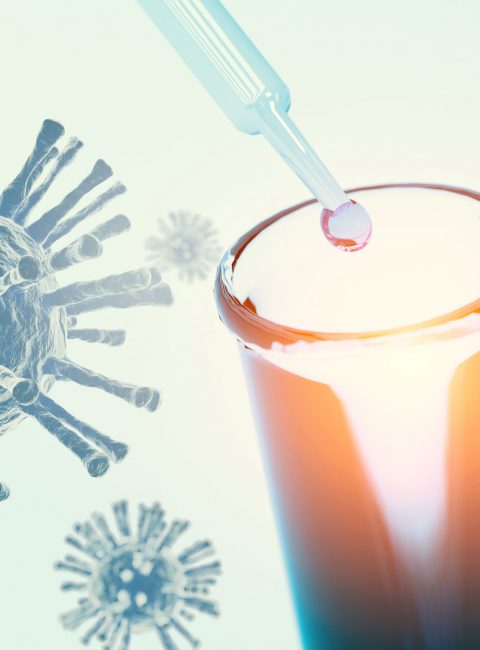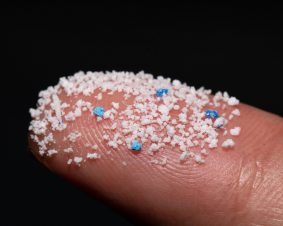 >
Spotlight March 2021: Is Nanotechnology the Swiss Army Knife against Future Pandemics?
>
Spotlight March 2021: Is Nanotechnology the Swiss Army Knife against Future Pandemics?
The COVID 19 outbreak has led to a fundamental rethinking of existing approaches to diagnosis, treatment, and prevention methods. The need for better and more efficient concepts is global and urgent. Nanotechnology has long been at the forefront of innovation and has led to advances in many different disciplines. Could this interdisciplinary field help develop a more comprehensive approach to combating COVID-19 as well as future pandemics?
This review published in the journal ACS NANO provides a general introduction to the novel coronavirus (SARS-CoV-2), the progression of the coronavirus disease 2019 (COVID-19) along with an overview of current vaccines. Additionally, some of the attempts to stop the first interaction of the virus with the target cells as well as preventing life-threatening processes are illustrated in detail. In this context, the interdisciplinary authors present and discuss several potential advantages of nanotechnology and the critical role it could have in the fight against COVID-19 and future pandemics both inside and outside the host. The authors highlight the multifunctional solutions offered by materials in the nanoscale e.g., by combining diagnostic and therapeutic into one. These nanotechnology-based-systems can increase the specificity and therefore the efficiency of immunosuppressant delivery to targeted cells resulting in a reduction of drug dose and drug distribution to nontarget organs. The authors also explain in detail the multiple ways, nanomaterials can assist vaccines or immunization research for example by boosting the upregulation required by the immune system or redirecting the immune response against antigens. Nanotechnology may similarly offer pathways to slow the spread of COVID-19; in this review, the development of self-disinfecting surfaces that would avoid contamination at hospitals or homes is also presented. Finally, to highlight the multifunctionality of nanomaterials, the authors examine how nanotechnology-based solutions could increase the safety of air-filtering devices such as masks.
Those interested in a more detailed description of emerging nanoscale materials or examples can read them in the original publication:
Weiss, C., Carriere, M., Fusco, L., Capua, I., Regla-Nava, J.A., Pasquali, M., Scott, J.A., Vitale, F., Unal, M.A., Mattevi, C. and Bedognetti, D., 2020. Toward nanotechnology-enabled approaches against the COVID-19 pandemic. ACS nano, 14(6), pp.6383-6406. DOI: 10.1021/acsnano.0c03697

Weitere Spotlights
Spotlight January 2021: Nanoplastics challenge – How to improve tracking of nanopolystyrene distribution in the environment.
In January, we present a paper published in the Nature Journal communications materials. The article focuses on the development of a new detection method of nanopolystyrene. The method not only makes it possible to detect nanoplastics in the environment for the first time, but also to determine their accumulation in plants and animals. Nanoplastics, which […]
Read moreSpotlight November 2021: Safe Materials from Scratch – Safe-by-Design in Materials Research
Advances in the field of materials science continue to amaze us with nanoscale materials with extraordinary chemical, electrical, optical, and numerous other properties. However, some nanoscale materials have different toxicological profiles compared to the same bulk material. Since safety issues are usually addressed just before launching a product into the market, safety issues may be […]
Read moreSpotlight March 2022: Safe Materials from Scratch – Safe-by-Design-Concept in action
In recent decades, German research on nanomaterials and new, innovative materials has been widely expanded by material safety aspects. European initiatives also pay significant attention to this: both the European Union (EU) Green Deal, and the Chemicals Strategy for Sustainability (CSS) aim to create a sustainable, climate-neutral economy with sustainable and safe chemicals and products, […]
Read moreSpotlight March 2023: How can photovoltaics be made safe and sustainable?
Conventional photovoltaic systems often have only low efficiency, i.e. only a fraction of the solar energy is converted into electrical energy and made usable. For this reason, research is being conducted into innovative materials that can significantly increase the energy yield and thus also enable more electrical energy to be generated from renewable sources. However, […]
Read more

